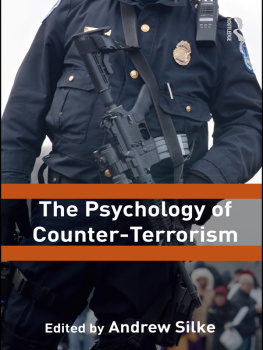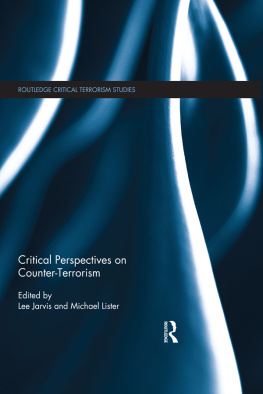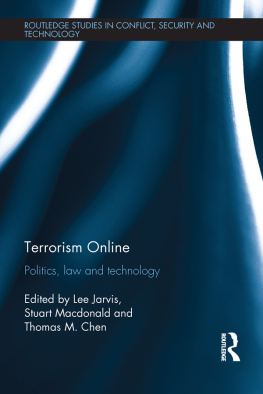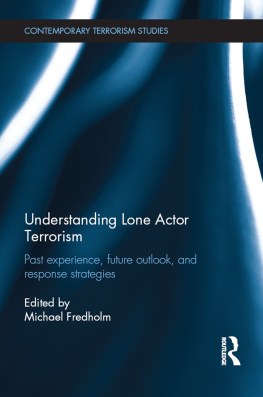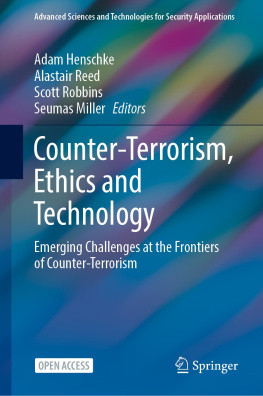HOSTILE INTENT AND COUNTER-TERRORISM
Human Factors in Defence
Series Editors:
Dr Don Harris, Managing Director of HFI Solutions Ltd, UK
Professor Neville Stanton, Chair in Human Factors at the
University of Southampton, UK
Dr Eduardo Salas, University of Central Florida, USA
Human factors is key to enabling todays armed forces to implement their vision to produce battle-winning people and equipment that are fit for the challenge of today, ready for the tasks of tomorrow and capable of building for the future (source: UK MoD). Modern armed forces fulfil a wider variety of roles than ever before. In addition to defending sovereign territory and prosecuting armed conflicts, military personnel are engaged in homeland defence and in undertaking peacekeeping operations and delivering humanitarian aid right across the world.
This requires top-class personnel, trained to the highest standards in the use of first class equipment. The military has long recognised that good human factors is essential if these aims are to be achieved.
The defence sector is far and away the largest employer of human factors personnel across the globe and is the largest funder of basic and applied research. Much of this research is applicable to a wide audience, not just the military; this series aims to give readers access to some of this high-quality work.
Ashgates Human Factors in Defence series comprises of specially commissioned books from internationally recognised experts in the field. They provide in-depth, authoritative accounts of key human factors issues being addressed by the defence industry across the world.
Hostile Intent and Counter-Terrorism
Human Factors Theory and Application
Edited by
ALEX STEDMON
Coventry University, UK
GLYN LAWSON
The University of Nottingham, UK
ASHGATE
Alex Stedmon, Glyn Lawson and contributors 2015
All rights reserved. No part of this publication may be reproduced, stored in a retrieval
system or transmitted in any form or by any means, electronic, mechanical, photocopying,
recording or otherwise without the prior permission of the publisher.
Alex Stedmon and Glyn Lawson have asserted their rights under the Copyright, Designs
and Patents Act, 1988, to be identified as the editors of this work.
Published by
Ashgate Publishing Limited
Wey Court East
Union Road
Farnham
Surrey, GU9 7PT
England
Ashgate Publishing Company
110 Cherry street
Suite 3-1
Burlington, VT 05401-3818
USA
www.ashgate.com
British Library Cataloguing in Publication Data
A catalogue record for this book is available from the British Library.
The Library of Congress has cataloged the printed edition as follows:
The Library of Congress Cataloging-in-Publication Data has been applied for.
ISBN: 978-1-4094-4521-0 (hbk)
ISBN: 978-1-4094-4522-7 (ebk-PDF)
ISBN: 978-1-4724-0210-3 (ebk-ePUB)
Contents
Alex Stedmon and Glyn Lawson
Alex Braithwaite
Pete Fussey
Valentina Bartolucci
Ron Iphofen
Dawn L. Eubanks, Ke Zhang and Lara Frumkin
Aldert Vrij, Sharon Leal and Samantha Mann
Peter Eachus, Alex Stedmon and Les Baillie
Alexandra L. Sandham, Thomas C. Ormerod, Coral J. Dando and Tarek Menacere
Brendan Ryan
Simon Andrews, Simon Polovina, Babak Akhgar, Andrew Staniforth, Dave Fortune and Alex Stedmon
Michael Kenney, John Horgan, Cale Horne, Peter Vining, Kathleen M. Carley, Mia Bloom and Kurt Braddock
Gordon Baxter and Ian Sommerville
John Parkinson OBE and Andrew Staniforth
Mils Hills and Ashwin Mehta
Emma Bradford and Margaret A. Wilson
Tanya Dronzina
Ben Dalton, Karen Martin, Claire McAndrew, Marialena Nikolopoulou and Teal Triggs
Rose Saikayasit, Alex Stedmon and Glyn Lawson
Christin Kirchhbel, David M. Howard and Alex Stedmon
Joan H. Johnston and V. Alan Spiker
Alex Stedmon and Glyn Lawson
List of Figures
List of Tables
List of Contributors
The Editors
Dr Alex Stedmon FIEHF CPsychol CSci FRSA is a Chartered Psychologist, Chartered Scientist, Fellow of the Institute of Ergonomics and Human Factors and Fellow of the Royal Society of Arts. He is a Reader in Human Factors at Coventry University. He worked for the Ministry of Defence before moving into academia and explores human factors issues of technology use in security applications as well as contextual methods for investigating suspicious behaviours in various security-related domains. Alex was one of the technical leads for a strategic security consortium (the Engineering and Physical Sciences Research Council project Shades of Grey) and received Centre for Defence Enterprise funding for projects on human factors of automated CCTV; identifying human pheromones associated with deception; and collaborative intelligence information-gathering. Alex has co-edited special issues of Applied Ergonomics (44/2013): Detecting terrorist activities: hostile intent and suspicious behaviours, and The Journal of Police & Criminal Psychology (28(2)/2013) Terrorism Psychology: Theory and Application.
Dr Glyn Lawson FIEHF is a Lecturer within the Faculty of Engineering and a member of the Human Factors Research Group at The University of Nottingham. His research expertise includes the human-centred development of new technologies in design and engineering applications. Glyn has particular expertise in the evaluation of methods for predicting behaviour in emergency situations. He has also conducted research on deception detection and worked on requirements capture within the security domain. Glyn is a Fellow of the Institute of Ergonomics and Human Factors and sits on the Education and Training panel. Glyn co-edited the 2012 special issue of the Applied Ergonomics journal focused on detecting terrorist activities: hostile intent and suspicious behaviours; he also co-edited the 2013 special issue of The Journal of Police & Criminal Psychology which focused on terrorism psychology: theory and pplication.
Contributing Authors
Professor Babak Akhgar is Professor of Informatics and Director of CENTRIC at Sheffield Hallam University and a Fellow of the British Computer Society. He graduated from Sheffield Hallam University in Software Engineering, and later gained considerable commercial experience as a strategy analyst and methodology director for several companies. He consolidated this experience by obtaining a Masters degree (with distinction) in Information Systems in Management and a Ph.D. in Information Systems. Babak has more than 100 referred publications in international journals and conferences on information systems with specific focus on knowledge management (KM). He is member of the editorial boards of three international journals, and Chair and programme committee member of several international conferences. He has extensive and hands-on experience in development, management and execution of large international security initiatives (e.g. combating terrorism and organised crime, cyber security, public order and cross-cultural ideology polarisation). He has co-edited two recent books on intelligence management
Next page

